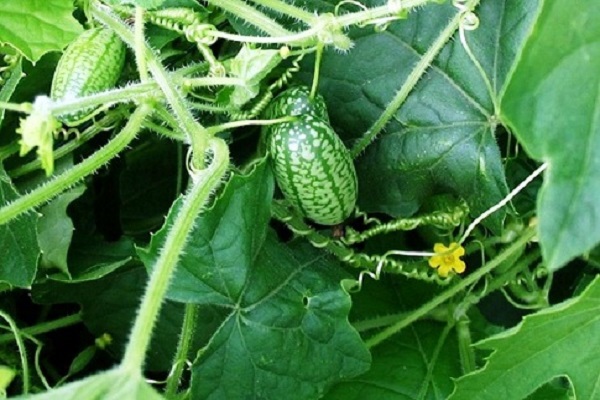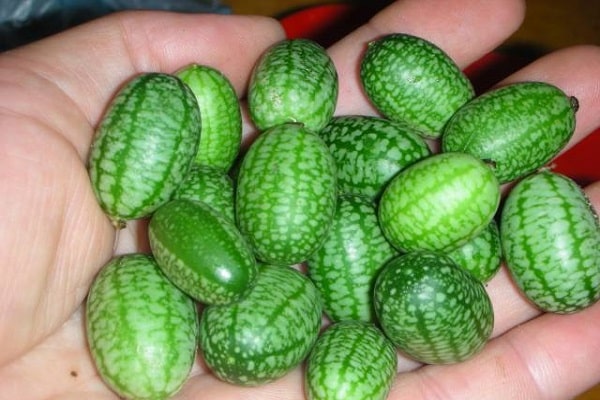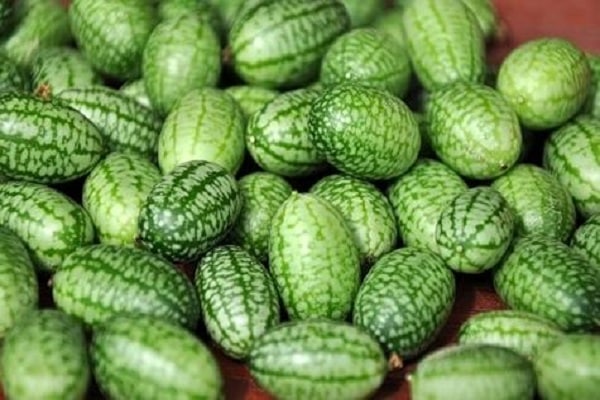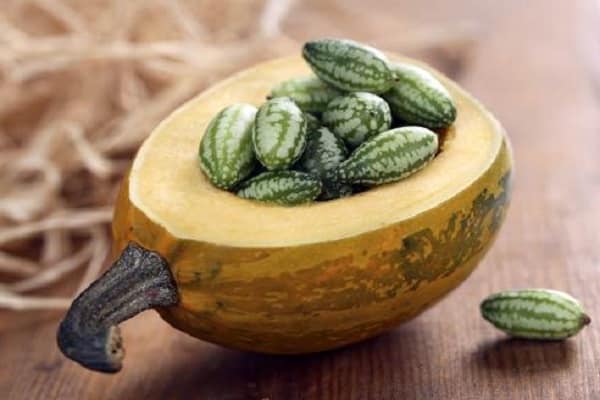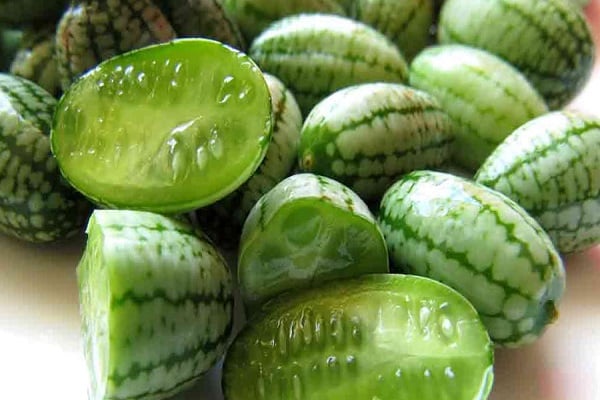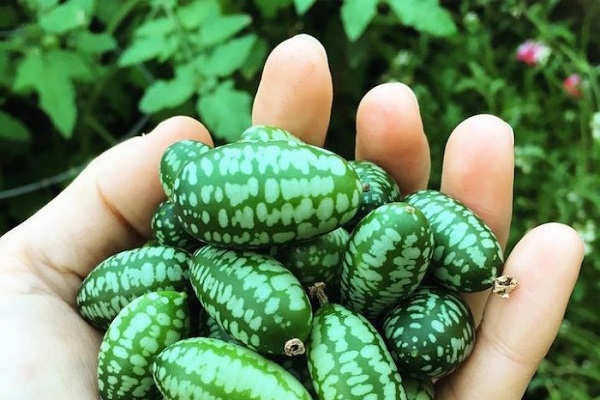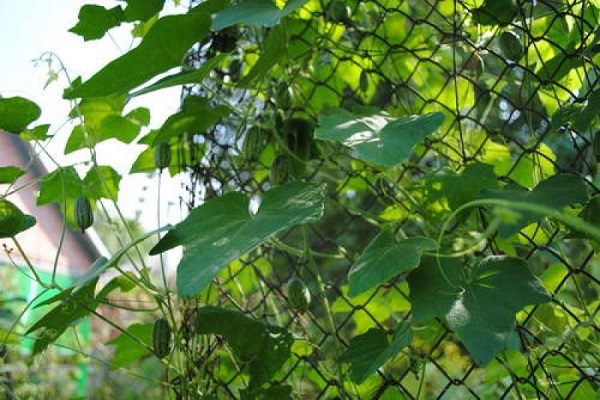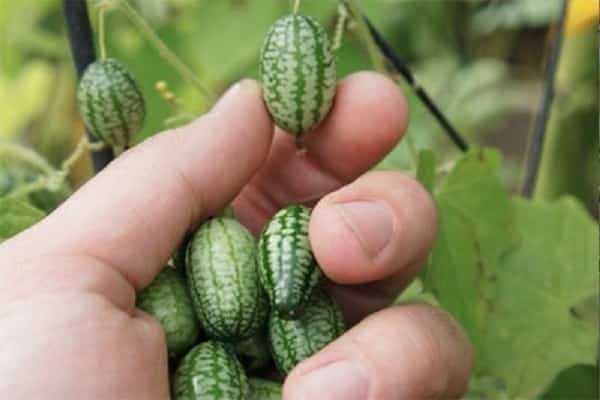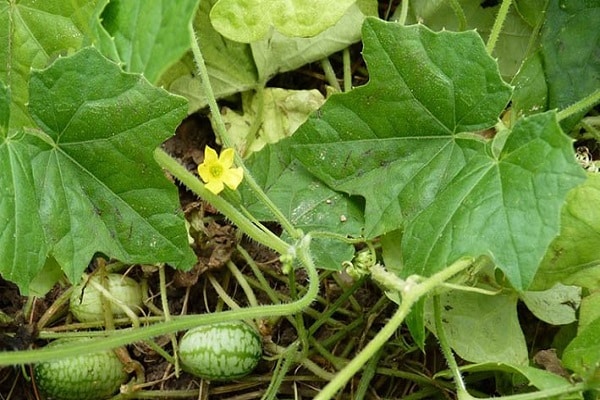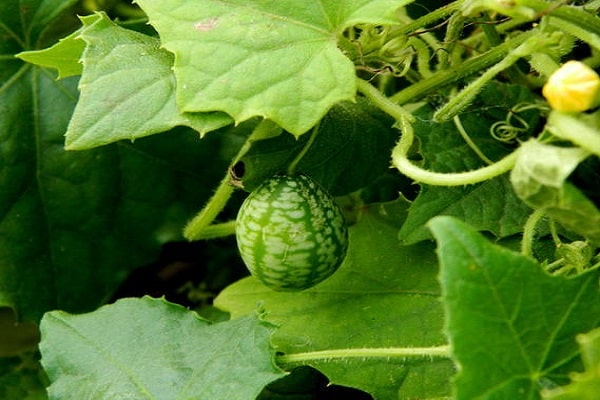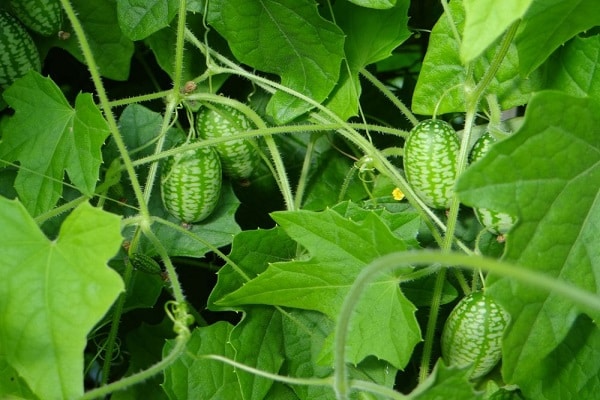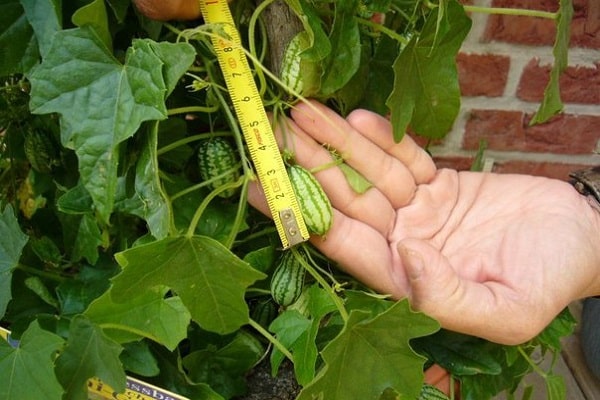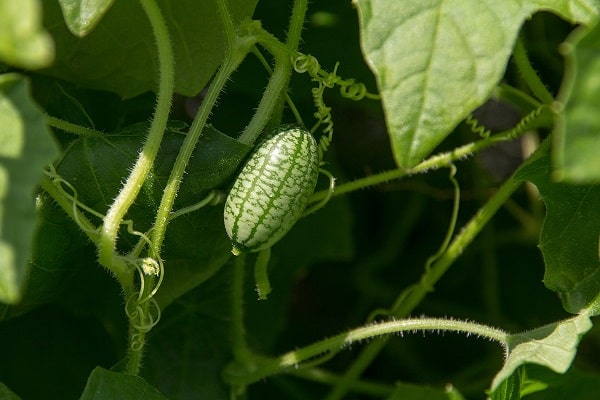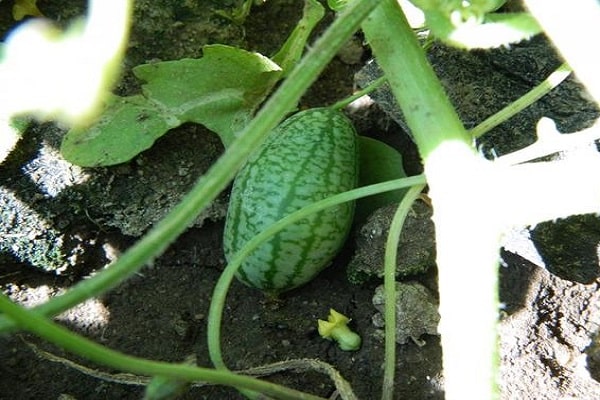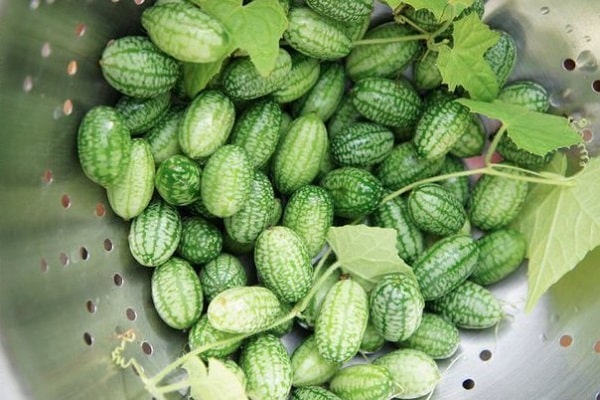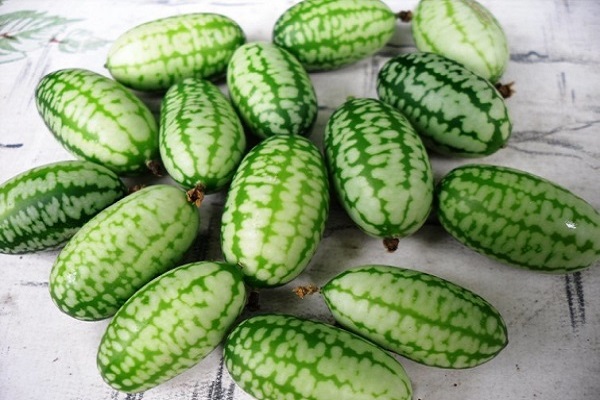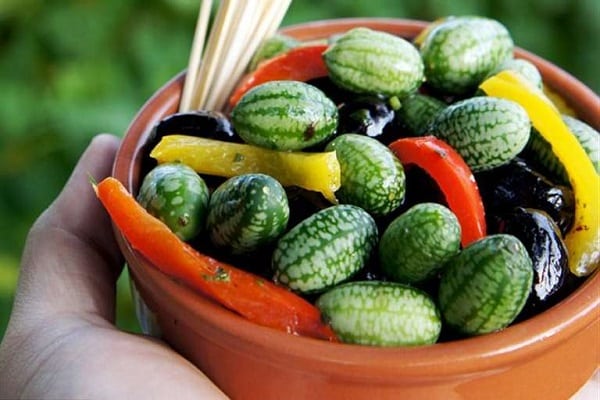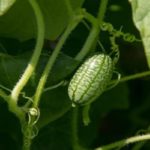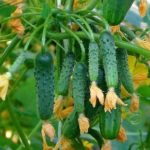Exotic plants can increasingly be found in summer cottages. Melotria rough is one of them, but it is interesting not only for its originality. Melotria is edible and also has health benefits.
Exotics in the garden
You understand that Melotria is a distant relative of our garden pumpkin plants when you learn the second name of the exotic - mouse melon. This is a vine that grows wild in Africa. Melothria is a member of the pumpkin family and loves the humidity of the tropics. Our gardeners have learned to grow African cucumber in greenhouses, apartments, open ground.
The liana is covered with triangular leaves, their color is rich, bright green. The length of African whips can reach up to 3 meters, which is impressive. Melon fruits are miniature, from 1.5 to 2 cm. Oval in shape, similar to miniature cucumbers, covered with a hard skin with bright stripes.
Advice. Harvest mini cucumbers every 2-3 days. Hanging on the whip, they become sweeter.
Melotria has small male and female flowers, funnel-shaped, yellow in color. Female flowers are solitary, male flowers are grouped in bunches. Melotria pleases with its fruits in July. Mousemelon tastes like cucumber, but sour.
The decorative qualities of mouse melon make it attractive to landscape designers. Liana decorates not only apartments, but also offices. Melotria's productivity is high. The collected fruits are eaten and used to successfully treat various diseases. The benefits of cucumbers are determined by their chemical composition.
Description of composition
Many useful microelements were found in the sourish pulp of Melotria. Cucumber contains all the substances we need:
- phosphorus;
- iron;
- calcium;
- magnesium;
- potassium.
Scientists have found vitamins important for the human body (B9, PP) in melon pulp. Nutritionists have calculated the calorie content of exotic cucumbers; it is 14 kcal per 100 g of product.
Reference. An interesting fact is that the pulp of Melotria is very watery, but the protein content exceeds that of classic cucumbers.
African cucumbers are included in the menu during fasting days. Other beneficial properties of cucumber are used to prevent diseases.
Beneficial features
Melon pulp contains fiber, which is beneficial for the intestines and cardiovascular system. You need to consume mini melon daily to experience the healing effect. There are benefits and certain harms from Melotria rough:
- the pulp of striped African cucumbers is eaten to prevent cancer;
- long-term consumption of fruits leads to normalization of blood pressure;
- in people with gallbladder problems, bile flow is facilitated.
The main direction of use of Melotria rough - fight against excess weight. With its help you can keep your weight normal. The fruits of mouse melon quickly cause a feeling of fullness, this helps to avoid overeating.
During a diet, melon can be safely included in the diet; it contains few calories. Nutritionists advise doing two fasting days a week. During these days, the diet may consist of African cucumbers, red peppers and tomatoes. For dressing salads, it is recommended to use kefir, but low-fat. After fasting days, swelling decreases, gastrointestinal function improves, and constipation does not bother you.
Contraindications
Not everyone can eat fresh fruits of Melotria rougha. They are contraindicated for people with stomach problems. Young African cucumbers are eaten fresh. Preparations are made from ripe fruits. It is not recommended for people to eat pickled melon:
- with a bad heart;
- with liver pathologies;
- with kidney diseases;
- with atherosclerosis;
- with hypertension.
Eating pickled exotics is prohibited for pregnant women.
Features of cultivation
When planning to grow Melotria rough, they adhere to the usual rules for caring for classic cucumbers; the agricultural technology of these two crops is similar. Melon is heat-loving; in open ground it is propagated only through seedlings.
Seedling
To sow seedlings, take glasses with a volume of 200 ml. A nutrient soil mixture is used as a filler. The soil is moistened, the seeds are not planted deeply, they are very small. The thickness of the soil on top of the seeds does not exceed 0.5 cm.
We create greenhouse conditions for better germination of Melotria seeds:
- Cover the box with melon with film;
- put in a warm place;
- choose sunny windows.
In just 3-4 days the first melon shoots will hatch. We remove the film and when the sprouts reach 5 cm, we begin to harden the seedlings. To do this, we provide ventilation using vents. At home, melon seedlings live until mid-May.
Landing
We pay special attention to the choice of site for mouse melon. Its characteristics are important:
- illumination;
- presence of drafts;
- predecessors.
We focus on sunny places without drafts. Vegetable crops from the list are considered good predecessors to the African cucumber:
- tomatoes;
- beans;
- peas;
- onion.
Bad predecessors for African cucumber: zucchini, cucumbers, squash, pumpkin. Some gardeners sow Melotria seeds directly on the ridge. There is only one plus from this - saving time on growing seedlings.
There are more disadvantages: late fruiting, developmental delay. If Melotria is used as an ornamental plant, then it can be propagated by seeds in the ground. In temperate climates, a hybrid of Melotria rough - Hummingbird F1 is grown; steps for planting:
- when planting on a ridge, adhere to the 40x40 cm pattern;
- immediately install supports in the form of a trellis;
- Water the cucumbers.
Further care is the same as for classic cucumbers.
Care
Water Melotria at intervals of 2 days. Pour at least 1 bucket onto one bush. The next day, loosen the soil. The absence of crust on the ground improves the nutrition of the roots. All summer you need to monitor the condition of the cucumbers. If there are signs of disease, treat with soapy water.
Urea is used as a top dressing in summer. Nitrogen fertilizing increases the growth of green mass of Melotria several times.The first cucumbers will form 14 days after transplantation. At the age of a week, the fetus can be removed. If harvesting is delayed, the crop will lose market value. African cucumber ripens quickly.
Reviews
Reviews best characterize new, unusual plants. After reading them, decide whether you need an exotic like Melotria in the garden or not.
Petro, Donetsk:
“I was surprised when in an ordinary flower shop in our city I came across the seeds of the exotic plant Melotria rough. I bought the seeds. The goal was to decorate the gazebo. The result was worth the trouble of growing mouse melon. The gazebo was bright green all summer.”
Elena, Tambov:
“Friends strongly recommended planting an African cucumber. Planted a melon into round holes. She took care of them like cucumbers. There were a lot of fruits, but small ones. I didn’t like the taste, I ate mini-cucumbers on fasting days. What they write about losing excess weight is true, I have lost weight.”
Andrey, Tuapse:
“I planted African seeds in a hole near a post. The pillar also wanted to decorate a piece of the old fence. All the seeds have sprouted. I didn’t do any special care: watered, loosened. I didn't like the fresh melons at all. I added them to marinades, they turned out well. The neighbor ate the melons raw and praised me.”

